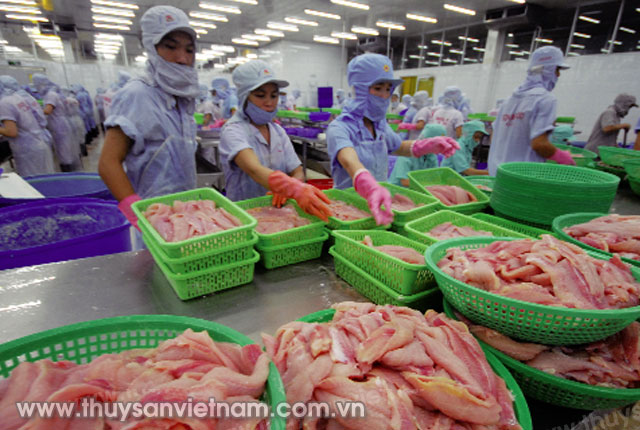MORE STANDARDS FOR PANGASIUS.
10/06/2017
On 9/5/2017, the Government issued Decree No. 55/2017 / ND-CP on management of farming and processing of pangasius to replace Decree No. 36/2014 / ND-CP. This decree has many new features compared to previous decree, especially the absence of controversial “criteria”.

Standards from farming area
In 2016, the total area of commercial catfish farming reached about 5,000 ha, the output is approximately 1.2 million tons. The export value of the whole year is over $ 1.7 billion USD, slightly higher than in 2015. However, along with the development and improvement of competitiveness, pangasius products are facing market fluctuations; increasing trade barriers and technical barriers from importing countries.
At the same time, although pangasius products are available in 140 markets around the world, favored by consumers, the image of pangasius is still affected by smear campaign. Most recently, in early 2017, Cuatro TV in Spain broadcasted “El Punto de Mira” with inaccurate and deliberate content denigrating Vietnamese pangasius farming on the Mekong River. After the program has been on air, the European supermarket chain Carrefour has announced that it will stop selling pangasius in its Spanish and Belgian stores and on its fresh counter in France. Although this does not have strong effect on the economy, it damages the image of Vietnam pangasius.
To avoid such unfortunate things, Decree 55 clearly stipulates conditions for commercial catfish farming. Specifically, the location, area of farming Pangasius should be in accordance with the land use planning of provincial People’s Committee. The infrastructure should meet technical requirements on commercial catfish farming. The farming should have separate water supplies and drainage systems. There should have places where waste and sludge can be treated to meet the requirements of environmental protection and veterinary hygiene. The farming also needs to meet the regulations on food safety assurance conditions prescribed by law and have a certificate of identification code of pond as stipulated in Article 4 of this Decree. This code is issued by the provincial aquaculture administrative authority (each pond is issued with a unique identification number). At the same time, the owner of the establishment must register the identification number of the pond for the first time or re-registration when changing the owner or change the pond area.
Remove the barriers on export
According to the Decree 36, Pangasius exporters must register for the Vietnam Pangasius Association and Customs to carry out customs clearance for consignments with certificates from the Association. This is very controversial, because according to the business logic, they had done out all procedures with Customs, doing this one more time will take time, cost and may miss opportunities for export. In Decree 55, this regulation has been removed. In addition, the Decree does not regulate the moisture content and glaze, which also caused many disagreements right after the promulgation.
According to the new regulations, export Pangasius products must be processed from processing enterprises which ensure four conditions. The first condition is meeting the conditions on business investment in Article 21 of Decree 66/2016/ND-CP dated 1 July 2016 of the Government (regulations on business conditions for investment in plant protection and quarantine, plant breeds, common forest animals, husbandry, aquaculture Products). Secondly, the places have to meet the regulations and technical regulations on food safety assurance conditions in aquatic product processing. Third is having a certificate of eligibility for food safety issued by a competent state management agency. Lastly, the places should having a traceability system that meets legal requirements and ensures access to the facility.
In case of an organization or individual exporting Pangasius products does not have a processing establishment that satisfies the above conditions, then one of two conditions must be satisfied: the contracts to buy Pangasius products processed at this processing establishments which meet the conditions mentioned above or have a processing contract with the owner of the processing facility meeting processing conditions. In addition, export pangasius products must meet the regulations of the importing country. In case of the law of the importing country is different from law of Vietnam, regulations of the importing country shall be applied. According to this Decree, organizations and individuals are not required to produce documents proving satisfaction of conditions when carrying out procedures for exporting fish products to the Customs.
With the advent of the new decree, pangasius farming management has been tightened, however, with export processing enterprises have a wider “breathing space”.
Bao Han
